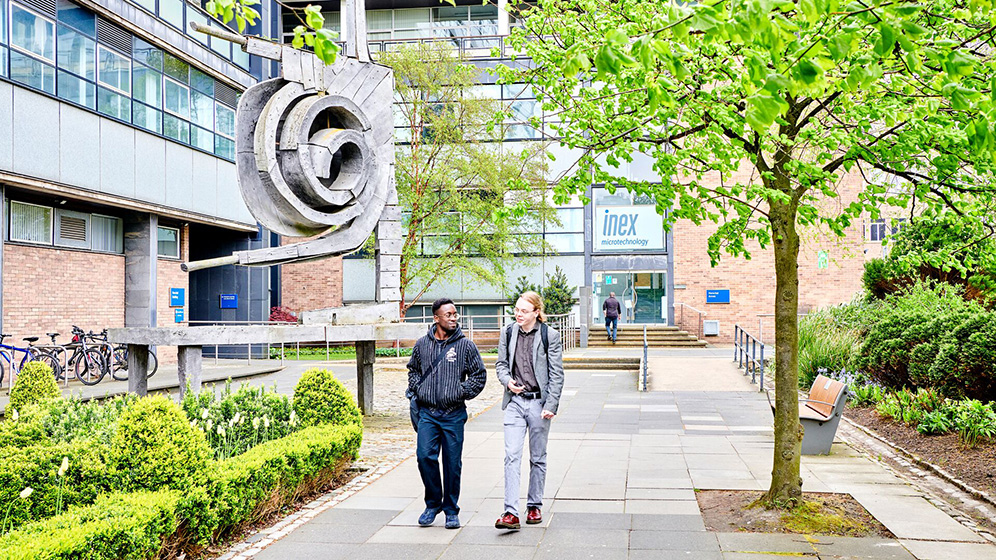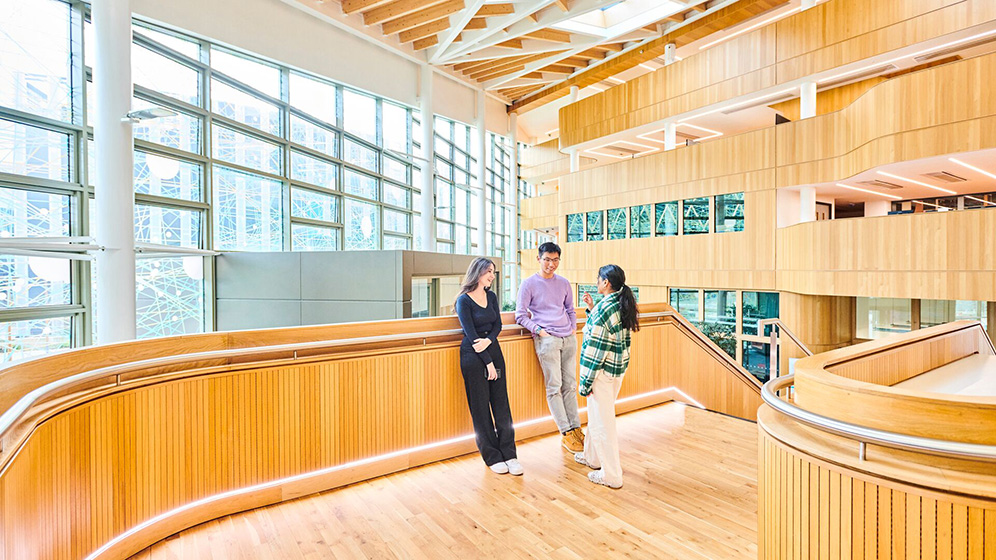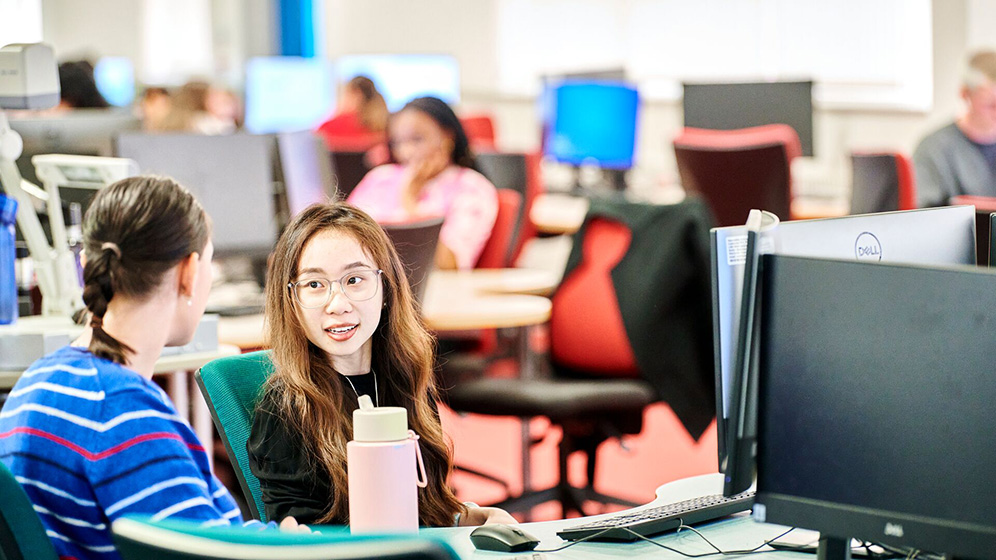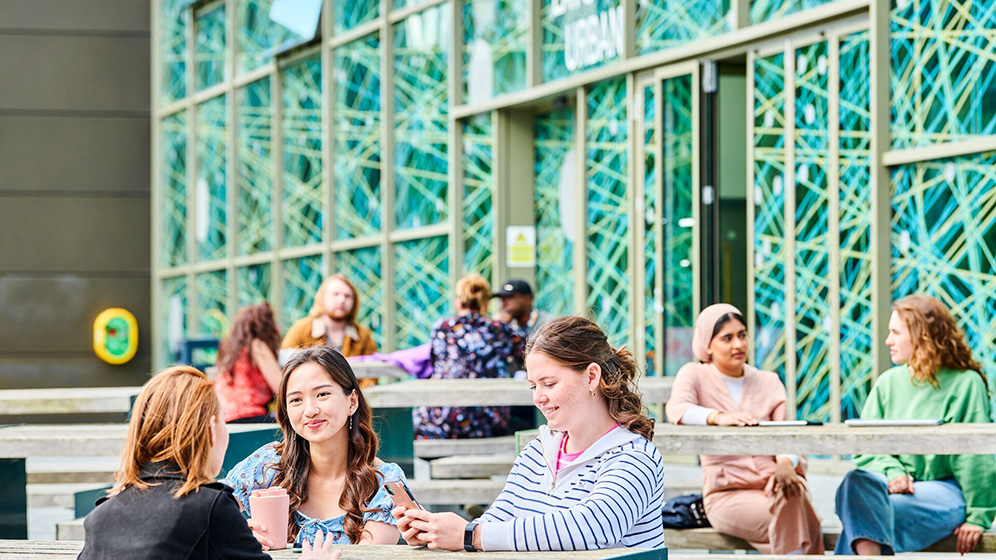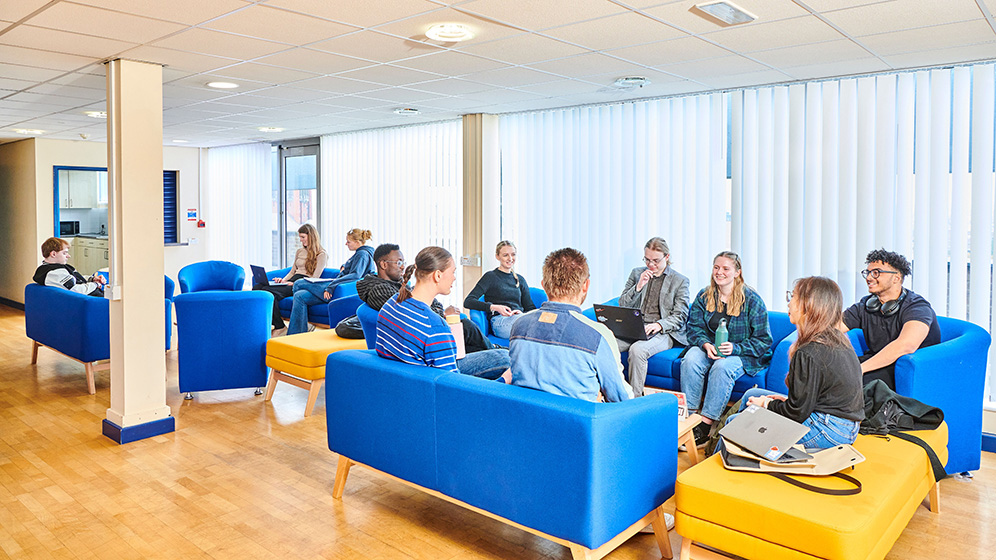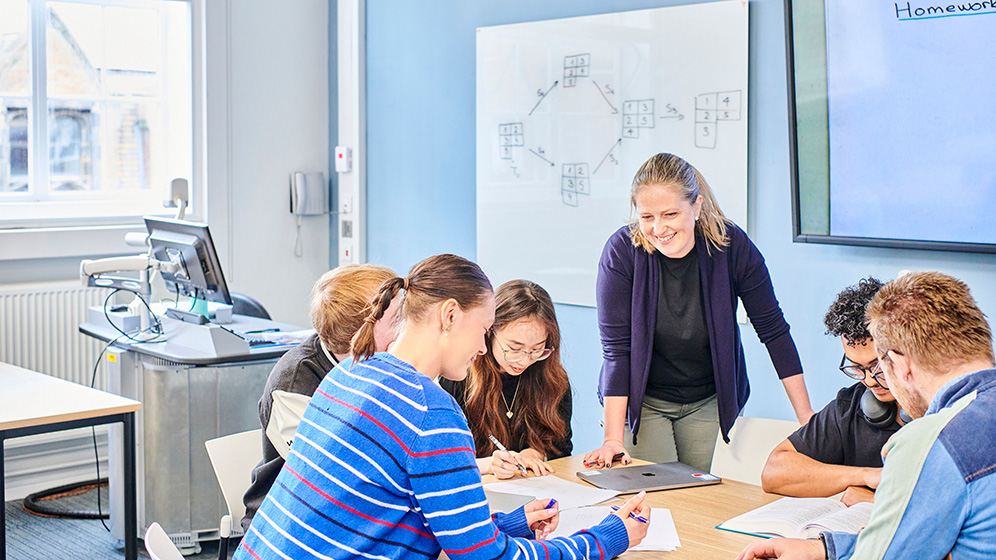Computing and Mathematics BSc Honours
- UCAS code: GG40
- Full time
- 3 years
Combine the power of computing and mathematics to become an expert in emerging and industry-relevant topics. Customise your degree with specialisms in Artificial Intelligence and Quantum Information and Computing.
You are currently viewing course information for entry year: 2026
Next start date:
- September 2026
UCAS Institution name and code:
- NEWC / N21
Course overview
Mathematics underpins many aspects of computer science. It combines theoretical problem-solving with practical implementation to tackle complex challenges. This powerful combination of skills are highly sought-after by industry.
Our Computing and Mathematics BSc Honours offers a dynamic mix of computing and mathematics, giving you a deep understanding of both disciplines. You'll see mathematics come to life in cutting-edge areas of computing.
The course is designed to be contemporary and industry-relevant, equipping you with in-demand skills needed by employers in the digital age. You'll graduate ahead of the curve, ready to tackle the challenges of the future.
Customise your degree
In your final year, you'll explore advanced topics in mathematics and customise your degree to your interests.
You can choose to specialise in:
- Artificial Intelligence
- Quantum Information and Computing
Or mix and match modules, and study topics you’re passionate about, including:
- Mathematical Biology
- Game Engineering
- Cryptography
You can also study abroad or take an industrial placement year.
Your course and study experience - disclaimers and terms and conditions
Please rest assured we make all reasonable efforts to provide you with the programmes, services and facilities described. However, it may be necessary to make changes due to significant disruption, for example in response to Covid-19.
View our Academic experience page, which gives information about your Newcastle University study experience for the academic year 2025-26.
See our terms and conditions and student complaints information, which gives details of circumstances that may lead to changes to programmes, modules or University services.
Additional information
Flexible degree options
This course offers flexibility. If your interests change during your studies, you can transfer to one of our:
- single honours Mathematics or Data Science BSc degrees after finishing Stage 1
- Computer Science BSc degrees after finishing Stage 2
This is perfect if you have a passion for mathematics and computing, but you’re not sure what you want to study.
Quality and ranking
Professional accreditation and recognition
All professional accreditations are reviewed regularly by their professional body.
Modules and learning
Modules
The information below is intended to provide an example of what you will study.
Most degrees are divided into stages. Each stage lasts for one academic year, and you'll complete modules totalling 120 credits by the end of each stage.
Our teaching is informed by research. Course content may change periodically to reflect developments in the discipline, the requirements of external bodies and partners, and student feedback.
Featured module
CSC3133: Quantum AlgorithmsIn this specialist module, you'll explore quantum computing and its key algorithms, uncovering what makes them so powerful. You’ll learn to design and implement quantum algorithms, as well as how to analyse the output of quantum simulations.

Optional module availability
Student demand for optional modules may affect availability.
Full details of the modules on offer will be published through the Programme Regulations and Specifications ahead of each academic year. This usually happens in May.
To find out more please see our terms and conditions
In Stage 1, you’ll gain a strong foundation in both computing and mathematics topics.
In computing, you’ll:
- develop fundamental computing techniques
- develop your core programming skills
- design, implement and test computer programs
In mathematics, you’ll explore topics such as:
- calculus
- probability
- statistics
- modelling and algebra
Modules
| Compulsory Modules | Credits |
|---|---|
| Programming Portfolio 1 | 30 |
| Introductory Algebra | 20 |
| Real Analysis | 10 |
| Introductory Calculus | 10 |
| Introduction to Probability and Statistics | 20 |
| Number Systems | 10 |
| Multivariable Calculus | 10 |
| Dynamics | 10 |
You’ll build on your skills and progress to more advanced topics in Stage 2 in both computing and mathematics.
You’ll explore subjects such as data science and cyber security. And we’ll introduce you to quantum theory and related areas in mathematics.
Alongside developing strong technical expertise, you'll also build essential professional skills to enhance your employability.
To prepare you for the demands of the industry, you'll collaborate on a software engineering team project that connects you with employers and tackles real-world challenges such as:
- climate change
- sustainable cities
- access to clean water
Modules
| Compulsory Modules | Credits |
|---|---|
| Foundations of Data Science | 20 |
| Security Programming | 20 |
| Algorithm Design and Analysis | 10 |
| Software Engineering Team Project | 30 |
| Linear Algebra | 10 |
| Groups and Rings | 10 |
| Principles of Quantum Mechanics | 10 |
| Differential Equations, Transforms and Waves | 10 |
You’ll customise your final year to suit your career goals and passions by choosing modules that shape your degree:
- mix and match to create a tailored degree
- specialise with our Artificial Intelligence or Quantum Information and Computing streams
Module highlights include:
- specialised group project, where you’ll bring all your skills together
- education module, where you’ll gain experience in teaching and science communication
Modules
Compulsory modules
| Compulsory modules | Credits |
|---|---|
| Inter-disciplinary Group Project | 20 |
Artificial Intelligence stream
If you choose this stream, you must also choose 30 credits from the list of optional modules.
| Compulsory modules | Credits |
|---|---|
| Biomedical Data Analytics and AI | 20 |
| Computer Vision and AI | 20 |
| Introduction to AI | 20 |
| Matrix Analysis | 10 |
Quantum Computing and Information stream
If you choose this stream, you must also choose 70 credits from the list of optional modules.
| Compulsory modules | Credits |
|---|---|
| Quantum Algorithms | 10 |
| Advanced Quantum Mechanics | 10 |
| Quantum Information | 10 |
Optional modules
If you don't choose the Artificial Intelligence or Quantum Computing stream, you must choose 100 credits from this list of optional modules.
We base these figures and graphs on the most up-to-date information available to us. They are based on the modules chosen by our students in 2024-25.
Teaching time is made up of:
- scheduled learning and teaching activities. These are timetabled activities with a member of staff present.
- structured guided learning. These are activities developed by staff to support engagement with module learning. Students or groups of students undertake these activities without direct staff participation or supervision
Teaching and assessment
Teaching methods
You’ll learn through a combination of different methods including:
- lectures
- small group seminars
- workshops
- hands-on computing labs and practicals
- interactive problem classes
Assessment methods
You'll be assessed through a combination of:
-
Assessments
-
Case studies
-
Coursework
-
Examinations – practical or online
-
Group work
-
Portfolio submission
-
Practical sessions
-
Projects
-
Reflective report/journal
-
Reports
Skills and experience
Practical skills
Computing is a very practical subject. You’ll put theory into practice through applied lab classes, modelling software and testing different technologies.
You’ll work on authentic and realistic global challenges, such as:
- healthcare and disease prevention
- ethical AI development
- data privacy
- environmental sustainability
Business skills
The group project will help you develop your employability skills, such as:
- project management
- communicating your ideas and solutions
- team working
- report writing
Some projects will work with an industry client. You’ll get hands-on experience solving real business challenges and building connections that could enhance your future career.
Mathematical problem-solving, analytical thinking, and a strong understanding of data and statistics are essential skills you’ll learn. You can apply them across a wide range of careers and industries.
With expertise in both computing and mathematics, you'll learn to:
- identify the key features of complex problems
- abstract them effectively
- apply the right tools to develop solutions
Research skills
Our teaching is informed by research. Each module is shaped by the latest research and expertise from our academic staff.
For example, in our Quantum Computing and Information stream, you’ll learn how our researchers use quantum mechanics to design technologies that solve real-world problems in communications, metrology, and computing.
Group projects help you develop your own research skills. You will:
- explore your ideas
- experiment with technologies
- find innovative solutions to real-world problems
You'll also review existing work, choose the best approaches, and apply the right mathematical techniques for the task. You'll learn to communicate your ideas effectively and present your findings with clarity and evidence.
Opportunities
Industrial placement year
You can complete a paid industrial placement year in two ways:
- Accredited placement with the School of Computing: You will work in a computing-focused role with any organisation. This placement needs to be approved by the School, but it's a good option if you want to pursue a career in computing.
- University placement: You can choose a placement in any field or industry. This is a good option if you're looking for diverse industry experience, in computing or a different field.
Study abroad
Experience life in another country by choosing to study abroad as part of your degree. You’ll be encouraged to embrace fun and challenging experiences, make connections with new communities and graduate as a globally aware professional, ready for your future.
You can choose to spend up to a year studying at a partner institution overseas.
If you choose to study abroad, it will extend your degree by a year.
Short-term global opportunities
During your degree, you can get involved in short-term global opportunities with activities ranging from four days to more than eight weeks. Our students have recently taken part in:
- South Korea: First Steps in Programming a Humanoid AI Robot at Seoul National University
- Hong Kong: HKUST International Summer Exchange Program, Summer 2024, at The Hong Kong University of Science and Technology
- Denmark: Business Intelligence from Web Data Analytics and Data Mining at Aarhus University
- Japan: Absolute Internship
- Peru: EcoSwell
- Singapore: Global Impact Start Up Challenge at Singapore University of Social Sciences
Funding is available to support our students who want to take part.
Facilities and environment
Facilities
You’ll benefit from the strengths, expertise and resources from the University’s:
You’ll split the majority of your study time between the Herschel Building and the Urban Sciences Building. Both buildings have designated study and social spaces.
Herschel Building
Home to the School of Mathematics, Statistics and Physics, you’ll have access to a welcoming learning environment to support your studies. There are extensive IT facilities for teaching and self-study, including our Interactive Learning Lab.
The Herschel Building is next to Newcastle’s high street in the city centre and close to the Students’ Union.
Urban Sciences Building
The School of Computing is based in the £58 million Urban Sciences Building (USB), offering cutting-edge facilities, including:
- cyber-physical systems laboratory
- games laboratory
- state-of-the art computer labs
- 315 PCs with a Raspberry Pi3 on every desk
The USB is a flagship development located on the £350 million Newcastle Helix regeneration site in the heart of Newcastle. It brings together:
- academia
- businesses
- industry
Support
Wellbeing and inclusivity are at the heart of our Schools values. Both Schools have their own School Wellbeing Advisor.
You'll also be assigned a Peer Mentor to help you in your first year. They are fellow students who can help you settle in and answer any questions you have when starting university.
The USB has several wellbeing spaces for students, including:
- The Retreat: A sensory space with relaxing stimuli to distract from busy student life.
- Student chill-out space: A relaxed area to unwind with your peers.
- Prayer room: For all faiths and none, this space can be used for prayer or quiet reflection.
The School of Computing also organises a range of wellbeing activities throughout the year.
Academic support
You'll be assigned an academic tutor, who will support you throughout your degree. You'll also benefit from our:
- induction programme, including social events, to help you settle in quickly
- activities and events run by our student-run societies, including Maths Society and Computing and Technology Society
- homework classes to help with assignments
Numbas learning software
You'll have access to a specialist learning software called Numbas. Developed at Newcastle University, it's now used by mathematicians and statisticians worldwide.
This innovative software allows you to work on interactive code worksheets, so you can test and refine your skills throughout your course.
Your future
Your career
The world, and industry, is becoming more and more digital.
Computing and mathematics are a valued combination in today’s industries. You’ll apply the skills and techniques from this course in a wide range of industries.
You’ll graduate with unique skills in modern and emerging technologies. You'll have a competitive edge with a range of career opportunities.
If you specialise in AI or quantum computing, you’ll be prepared to join businesses exploring and implementing these technologies.
After graduation, you'll be ready to explore many career paths, including:
- codebreaking
- intelligence
- quantum technology
- cyber security
- disease prevention
- smart transportation
- climate change
Further study
This degree provides a pathway to Master's and PhD-level study in a variety of fields. This depends on the optional modules you choose.
As a Computing and Mathematics graduate, you can pursue advanced research in:
- artificial intelligence and machine learning
- quantum computing
- data science and big data
- applied mathematics
- robotics
- computational finance
- mathematical optimisation
- computational biology
Strong industry links
The School of Computing and School of Mathematics, Statistics and Physics both have strong industry connections. They’re each supported by an Industrial Advisory Board, with experts from various fields.
The board guides our curriculum and offers valuable career opportunities for our students.
We have connections with:
- Meta
- Accenture
- JP Morgan
- DXC Technology
- PwC
- P&G
- Airbus
- Sage Plc
- NHS
- Atom Bank
- Rockstar Games
Through our connections, we organise activities such as:
- guest lectures
- industry-focused group projects
- careers and subject fairs
- student prizes sponsored by industry
- skill workshop delivered by industry and alumni
Careers support
Our Careers Service is one of the largest and best in the country, and we have strong links with employers. We provide an extensive range of opportunities to all students through our ncl+ initiative.
Visit our Careers Service website
Recognition of professional qualifications outside of the UK
If you’re studying an accredited degree and thinking about working in Europe after you graduate, the best place to find current information is the UK Government’s guidance on recognition of UK professional qualifications in EU member states. This official resource explains whether your profession is regulated in another country, what steps you need to take, and which organisation you should contact.
Entry requirements
All candidates are considered on an individual basis and we accept a broad range of qualifications.
The entrance requirements and offers below apply to 2026 entry.
| A-Level | |
|---|---|
| International Baccalaureate | |
|---|---|
Other UK and the Republic of Ireland qualifications
Alternative offers at Newcastle
Through one of our contextual or alternative offer routes, you could receive an offer of up to three grades lower than the typical requirements.
Contextual offers
We use certain contextual data from your UCAS form, alongside your application, to consider challenges that you may have faced in your education and the potential effect this may have had on your qualifications. This means you may be eligible to receive a lower contextual offer.
PARTNERS offers
One of the largest and longest support entry routes to university of its kind for students from underrepresented backgrounds. We support applicants from application through to study.
Realising Opportunities offers
A unique programme delivered in collaboration with 10 leading, research-intensive universities in the UK. The programme is open to students in Year 12/first year of college.
Pathways to Newcastle offers
Pathways to Newcastle, our national skills entry route, is available for specific subject areas.
High Performance Athletes
We support promising athletes at the application stage, who compete in regional, national or international levels in their sport.
Qualifications from outside the UK
English Language requirements
Entrance courses (INTO)
International Pathway courses are specialist programmes designed for international students who want to study in the UK. We provide a range of study options for international students in partnership with INTO.
These courses are specifically designed for international students who want to study in the UK and progress onto one of our undergraduate degrees. Our International Study Centre, has a range of study options including:
- International Foundation
- International Year One
- English Language courses
Find out more about International Pathway courses
Admissions policy
This policy applies to all undergraduate and postgraduate admissions at Newcastle University. It is intended to provide information about our admissions policies and procedures to applicants and potential applicants, to their advisors and family members, and to staff of the University.
University Admissions Policy and related policies and procedures
Credit transfer and Recognition of Prior Learning
Recognition of Prior Learning (RPL) can allow you to convert existing relevant university-level knowledge, skills and experience into credits towards a qualification. Find out more about the RPL policy which may apply to this course.
Tuition fees and scholarships
Tuition fees for academic year 2026-2027
The 2026 entry home fees have not yet been confirmed.
| Qualification: BSc Honours | |
|---|---|
|
Home students full time 3 years |
Tuition fees (Year 1)
Not set |
|
International students full time 3 years |
Tuition fees (Year 1)
31,500 |
Year abroad and additional costs
For programmes where you can spend a year on a work placement or studying abroad, you will receive a significant fee reduction for that year.
Some of our degrees involve additional costs which are not covered by your tuition fees.
Scholarships
Find out more about:
Open days and events
You'll have a number of opportunities to meet us throughout the year at our on-campus and virtual open days.
You'll be able to:
- explore our beautiful campus
- find out about our vibrant city
- discover what students think about studying at Newcastle
You'll also have the opportunity to speak to academic staff and find out more about the subjects you're interested in.
Find out about how you can visit Newcastle in person and virtually.
We regularly travel overseas to meet with students interested in studying at Newcastle University. Visit our events calendar to find out when we're visiting your region.
How to apply
Apply through UCAS
To apply for undergraduate study at Newcastle University, you must use the online application system managed by the Universities and Colleges Admissions Service (UCAS). All UK schools and colleges, and a small number of EU and international establishments, are registered with UCAS. You will need:
- the UCAS name and institution codes for Newcastle University (NEWC/N21)
- the UCAS code for the course you want to apply for
- the UCAS 'buzzword' for your school or college
If you are applying independently, or are applying from a school or college which is not registered to manage applications, you will still use the Apply system. You will not need a buzzword.
Apply through UCASApply through an agent
International students often apply to us through an agent. Have a look at our recommended agents and get in touch with them.
Get in touch
By phone
Call us on +44 (0) 191 208 3333 and press option 1. Our opening hours are Monday to Friday 10am until 4pm.
Live chat
Our NCL chatbot might be able to give you an answer straight away. If not, it’ll direct you to someone who can help.
You'll find our NCL chatbot in the bottom right of this page.
Online
Keep updated
We regularly send email updates and extra information about the University.
Receive regular updates by email








